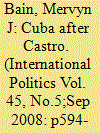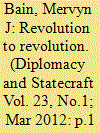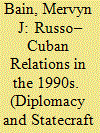| Srl | Item |
| 1 |
ID:
082930


|
|
|
|
|
| Publication |
2008.
|
| Summary/Abstract |
The focus of this article is the relationship that developed between Russia and Cuba in the years since the disintegration of the Soviet Union. The reasons for both the deterioration in relations in the early 1990s and their improvement from the middle of the decade will be analysed. A variety of different causes are important for both but significantly the improvement in the relationship has taken place when globally the neoliberal economic model has been pre-eminent. This article will argue that chief among the reasons for closer Russian-Cuban relations has been the neoliberal economic model.
|
|
|
|
|
|
|
|
|
|
|
|
|
|
|
|
| 2 |
ID:
193158


|
|
|
|
|
| Summary/Abstract |
This article uses a qualitative historical analysis to scrutinise previously underutilised documents housed in the Ministerio de Relaciones Exteriores de Cuba (MINREX) archive in Havana to examine Cuban-Soviet relations during 1991, the final tumultuous year of close Havana-Moscow relations. Specific focus will be given to the MINREX reaction to the August 1991 coup in Moscow and its aftermath. This article will offer several new findings. Principally that throughout 1991 MINREX officials firstly attempted to affect the bilateral relationship by both lobbying Soviet officials while in Cuba, and they proposed utilising glasnost for their own purposes. This proposal was despite a conceptual aversion to the Soviet process. Secondly, MINREX officials endeavoured to lobby Russian officials, including trying to facilitate a meeting with Andrei Kozyrev the Russian Foreign Minister. These endeavours were notwithstanding the adverse reporting of Boris Yeltsin, the Russian President, and his actions during 1991 in both the MINREX documents and Cuban state media.
|
|
|
|
|
|
|
|
|
|
|
|
|
|
|
|
| 3 |
ID:
111564


|
|
|
|
|
| Publication |
2012.
|
| Summary/Abstract |
It has traditionally been assumed that the relationship between Moscow and Havana commenced with the victory of the Cuban Revolution. Although it subsequently developed to unprecedented levels, this article examines the relationship in the period between the Russian and Cuban Revolutions. This analysis is conducted within the framework of Soviet policy towards the Developing World and the realist paradigm of International Relations theory. Prior to January 1959, the Kremlin took a considerable interest in Cuba and did not suffer from "geographical fatalism" as has previously been presumed. This is important in itself, but also for the relationship that rapidly developed in the aftermath of the Cuban Revolution as a number of factors that were important in the pre-1959 relationship would also be significant after 1959. Furthermore, this analysis is also important for the contemporary bilateral relationship as both governments have made increasing reference to the multifaceted relationship that existed priorx to 1959.
|
|
|
|
|
|
|
|
|
|
|
|
|
|
|
|
| 4 |
ID:
160230


|
|
|
|
|
| Summary/Abstract |
This analysis re-examines Russo–Cuban relations in the period in which Boris Yeltsin was Russian President using previously unseen documents housed in the Ministerio de Relaciones Exteriores de Cuba [MINREX] archive in Havana. A number of conclusions offer themselves including that the relationship remained key for Havana throughout the 1990s, despite a Cuban ideological aversion to the Russian reforms of the early to mid-decade and the subsequent “new realities” of Russo–Cuban relations. Cuba desired a relationship that preserved a number of features of Soviet–Cuban relations, which MINREX officials strove to achieve by purposefully creating a political legacy from the Soviet era, whilst also specifically lobbying members of the Russian political elite who had sympathies with the Soviet period. This development has resonance for contemporary Russo–Cuban relations that are at their most robust politically since 1991. Consequently, the Soviet legacy remains both much greater than previously thought and deliberately created by Cuba.
|
|
|
|
|
|
|
|
|
|
|
|
|
|
|
|